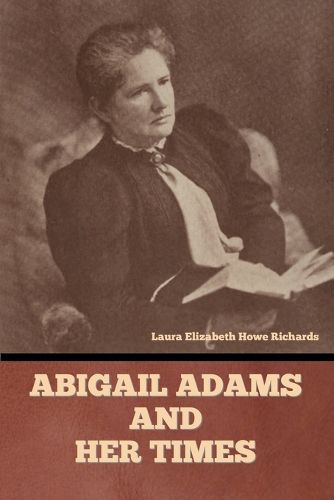Readings Newsletter
Become a Readings Member to make your shopping experience even easier.
Sign in or sign up for free!
You’re not far away from qualifying for FREE standard shipping within Australia
You’ve qualified for FREE standard shipping within Australia
The cart is loading…






This title is printed to order. This book may have been self-published. If so, we cannot guarantee the quality of the content. In the main most books will have gone through the editing process however some may not. We therefore suggest that you be aware of this before ordering this book. If in doubt check either the author or publisher’s details as we are unable to accept any returns unless they are faulty. Please contact us if you have any questions.
About the Author:
Laura Elizabeth Howe Richards (February 27, 1850 - January 14, 1943) was an American writer. She wrote more than 90 books including biographies, poetry, and several for children. One well-known children's poem is her literary nonsense verse Eletelephony.
Laura Elizabeth Howe was born in Boston, Massachusetts, on February 27, 1850. Her father was Dr. Samuel Gridley Howe, an abolitionist and the founder of the Perkins Institution and Massachusetts School for the Blind. She was named after his famous deaf-blind pupil Laura Bridgman. Her mother Julia Ward Howe wrote the words to "The Battle Hymn of the Republic".
In 1871, Laura married Henry Richards. He would accept a management position in 1876 at his family's paper mill at Gardiner, Maine, where the couple moved with their three children. In 1917 Laura won a Pulitzer Prize for Julia Ward Howe, 1819-1910, a biography, which she co-authored with her sisters, Maud Howe Elliott and Florence Hall.
She died on January 14, 1943, at Gardiner, Maine, 44 days before her 93rd birthday.
A pre-kindergarten-to-fifth-grade elementary school in Gardiner, Maine, bears her name. Her children's book Tirra Lirra won the Lewis Carroll Shelf Award in 1959. Her home in Gardiner, the Laura E. Richards House, is listed on the National Register of Historic Places.
Richards contributed poetry to St. Nicholas Magazine. (wikipedia.org)
$9.00 standard shipping within Australia
FREE standard shipping within Australia for orders over $100.00
Express & International shipping calculated at checkout
This title is printed to order. This book may have been self-published. If so, we cannot guarantee the quality of the content. In the main most books will have gone through the editing process however some may not. We therefore suggest that you be aware of this before ordering this book. If in doubt check either the author or publisher’s details as we are unable to accept any returns unless they are faulty. Please contact us if you have any questions.
About the Author:
Laura Elizabeth Howe Richards (February 27, 1850 - January 14, 1943) was an American writer. She wrote more than 90 books including biographies, poetry, and several for children. One well-known children's poem is her literary nonsense verse Eletelephony.
Laura Elizabeth Howe was born in Boston, Massachusetts, on February 27, 1850. Her father was Dr. Samuel Gridley Howe, an abolitionist and the founder of the Perkins Institution and Massachusetts School for the Blind. She was named after his famous deaf-blind pupil Laura Bridgman. Her mother Julia Ward Howe wrote the words to "The Battle Hymn of the Republic".
In 1871, Laura married Henry Richards. He would accept a management position in 1876 at his family's paper mill at Gardiner, Maine, where the couple moved with their three children. In 1917 Laura won a Pulitzer Prize for Julia Ward Howe, 1819-1910, a biography, which she co-authored with her sisters, Maud Howe Elliott and Florence Hall.
She died on January 14, 1943, at Gardiner, Maine, 44 days before her 93rd birthday.
A pre-kindergarten-to-fifth-grade elementary school in Gardiner, Maine, bears her name. Her children's book Tirra Lirra won the Lewis Carroll Shelf Award in 1959. Her home in Gardiner, the Laura E. Richards House, is listed on the National Register of Historic Places.
Richards contributed poetry to St. Nicholas Magazine. (wikipedia.org)